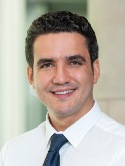Effect of tumor genetics, pathology, and location on fMRI of language reorganization in brain tumor patients Journal Article
| Authors: | Pasquini, L.; Yildirim, O.; Silveira, P.; Tamer, C.; Napolitano, A.; Lucignani, M.; Jenabi, M.; Peck, K. K.; Holodny, A. |
| Article Title: | Effect of tumor genetics, pathology, and location on fMRI of language reorganization in brain tumor patients |
| Abstract: | Objectives: Language reorganization may follow tumor invasion of the dominant hemisphere. Tumor location, grade, and genetics influence the communication between eloquent areas and tumor growth dynamics, which are drivers of language plasticity. We evaluated tumor-induced language reorganization studying the relationship of fMRI language laterality to tumor-related variables (grade, genetics, location), and patient-related variables (age, sex, handedness). Methods: The study was retrospective cross-sectional. We included patients with left-hemispheric tumors (study group) and right-hemispheric tumors (controls). We calculated five fMRI laterality indexes (LI): hemispheric, temporal lobe, frontal lobe, Broca’s area (BA), Wernicke’s area (WA). We defined LI ≥ 0.2 as left-lateralized (LL) and LI < 0.2 as atypical lateralized (AL). Chi-square test (p < 0.05) was employed to identify the relationship between LI and tumor/patient variables in the study group. For those variables having significant results, confounding factors were evaluated in a multinomial logistic regression model. Results: We included 405 patients (235 M, mean age: 51 years old) and 49 controls (36 M, mean age: 51 years old). Contralateral language reorganization was more common in patients than controls. The statistical analysis demonstrated significant association between BA LI and patient sex (p = 0.005); frontal LI, BA LI, and tumor location in BA (p < 0.001); hemispheric LI and fibroblast growth factor receptor (FGFR) mutation (p = 0.019); WA LI and O6-methylguanine-DNA methyltransferase promoter (MGMT) methylation in high-grade gliomas (p = 0.016). Conclusions: Tumor genetics, pathology, and location influence language laterality, possibly due to cortical plasticity. Increased fMRI activation in the right hemisphere was seen in patients with tumors in the frontal lobe, BA and WA, FGFR mutation, and MGMT promoter methylation. Key Points: • Patients harboring left-hemispheric tumors present with contralateral translocation of language function. Influential variables for this phenomenon included frontal tumor location, BA location, WA location, sex, MGMT promoter methylation, and FGFR mutation. • Tumor location, grade, and genetics may influence language plasticity, thereby affecting both communication between eloquent areas and tumor growth dynamics. • In this retrospective cross-sectional study, we evaluated language reorganization in 405 brain tumor patients by studying the relationship of fMRI language laterality to tumor-related variables (grade, genetics, location), and patient-related variables (age, sex, handedness). © 2023, The Author(s). |
| Keywords: | adult; controlled study; middle aged; retrospective studies; gene mutation; major clinical study; methylation; promoter region; genetics; patient selection; cancer patient; nuclear magnetic resonance imaging; brain tumor; glioma; brain neoplasms; magnetic resonance imaging; quality control; tumor localization; tumor volume; pathology; diagnostic imaging; retrospective study; temporal lobe; glioblastoma; nerve cell plasticity; fibroblast; cross-sectional study; cross-sectional studies; methylated dna protein cysteine methyltransferase; tumor growth; cancer control; fmri; language; frontal lobe; functional magnetic resonance imaging; hemispheric dominance; right hemisphere; brain mapping; electroencephalogram; multinomial logistic regression; brain tumors; echo planar imaging; fibroblast growth factor receptor; tumor invasion; procedures; wernicke area; language test; humans; human; male; female; article; patient history of radiotherapy; neural plasticity; head movement; patient history of chemotherapy; broca area; multiple tumor; fluid-attenuated inversion recovery imaging |
| Journal Title: | European Radiology |
| Volume: | 33 |
| Issue: | 9 |
| ISSN: | 0938-7994 |
| Publisher: | Springer |
| Date Published: | 2023-09-01 |
| Start Page: | 6069 |
| End Page: | 6078 |
| Language: | English |
| DOI: | 10.1007/s00330-023-09610-3 |
| PUBMED: | 37074422 |
| PROVIDER: | scopus |
| PMCID: | PMC10415458 |
| DOI/URL: | |
| Notes: | The MSK Cancer Center Support Grant (P30 CA008748) is acknowledged in the PDF -- Corresponding author is MSK author: Luca Pasquini -- Source: Scopus |
Altmetric
Citation Impact
BMJ Impact Analytics
Related MSK Work








